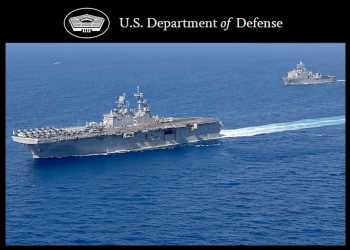Two U.S. ships have been deployed to the Middle East to help international partners in the region keep open important shipping lanes such as at the Strait of Hormuz and ensure safe passage of commercial vessels.
Sailors and Marines with the Navy’s Bataan Amphibious Ready Group and the 26th Marine Expeditionary Unit arrived in the Middle East as part of a pre-announced deployment to support deterrence efforts in the Strait of Hormuz and elsewhere, said Pentagon Press Secretary Brig. Gen. Pat Ryder.
“As we have been for a very long time, we’re coordinating with our partners in the region when it comes to U.S. military presence because, again, it’s not just the U.S. military that’s out there patrolling commercial shipping lanes. We’re working as part of a broader coalition … on that effort,” Ryder told reporters.
Sailors and Marines arrived in the region aboard the USS Bataan, an amphibious assault ship, and dock landing ship USS Carter Hall.
The strengthening of U.S. military prowess in the Strait of Hormuz comes in the wake of the Iranian navy’s attempt to seize two merchant vessels in the Strait of Hormuz and the Gulf of Oman last month.
According to a report from U.S. Central Command, on July 5, U.S. forces prevented two commercial tanker ships from being seized by the Iranian military in international waters near the coast of Oman.
One of those ships, the Marshall Islands-flagged oil tanker TRF Moss, was approached by an Iranian naval vessel, but it departed after the arrival of U.S. Navy guided-missile destroyer USS McFaul.
Later the same day, an Iranian naval vessel fired at the Bahamian-flagged oil tanker Richmond Voyager using small arms and crew-served weapons. The attack was thwarted by McFaul.
According to Centcom, Iran has attacked or seized about 20 merchant vessels since 2021.
Ryder said the increased U.S. presence in the Middle East is meant to help partners there keep open important shipping lanes such as at the Strait of Hormuz, which is a choke point between the Arabian Sea and the Persian Gulf. It also contributes further to a long-standing goal of preserving security and stability in the region.
The world depends on the strategic waterway for more than one fifth of the global oil supply.
An amphibious assault ship such as the USS Bataan can carry more than two dozen rotary-wing and fixed-wing aircraft. That could include MV-22 Osprey tilt-rotor aircraft and AV-8B Harrier attack jets, in addition to several amphibious landing craft. A dock landing ship such as the USS Carter Hall also supports operations for various rotary-wing aircraft, tactical vehicles, and amphibious landing craft.
Source: Read Full Article
-
Robert Peston gives verdict on ‘astonishing’ Liz Truss change in leadership bid
-
Starmer fails to condemn Labour MP for vile attack on Rishi’s race
-
Sir Bill Cash’s warning to Sunak over Northern Ireland deal
-
Suella Braverman speeding row dismissed as ‘trivial’
-
Boris gets huge leadership boost as stark data highlights Tory mistake

